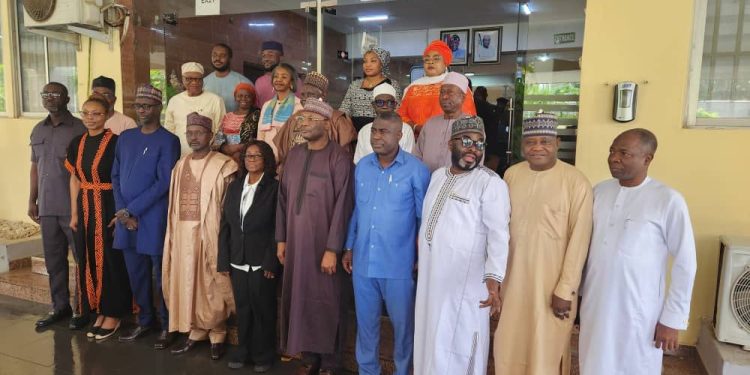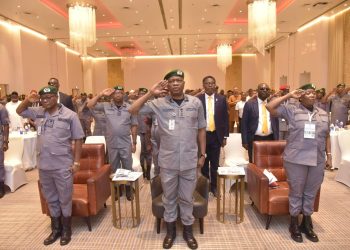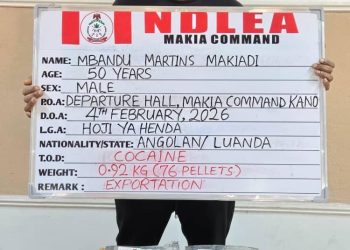By Nkechi Eze
The Independent National Electoral Commission (INEC) has announced the full implementation of all 13 recommendations addressed to it by the ECOWAS Election Observation Mission (EOM) following Nigeria’s 2023 General Elections, even as it awaits legislative action on those requiring legal reforms beyond its institutional control.
This was disclosed by the INEC Chairman, Professor Mahmood Yakubu, on Monday, July 28, 2025, during an official meeting with the ECOWAS Network of Electoral Commissions (ECONEC) Post-Election Follow-Up and Needs Assessment Mission, which commenced its working visit to Nigeria to evaluate progress made on a broader set of 37 electoral reform recommendations issued after the 2023 polls.
The ECONEC delegation is led by the Chairperson of the National Elections Commission of Liberia, Mrs. Davidetta Browne-Lansanah, accompanied by the Deputy Chairman of the Electoral Commission of Ghana, Dr. Bossman Asare, and the Acting Permanent Secretary of ECONEC, Mr. Serigne Mamadou Ka. The mission is tasked with examining the extent of implementation of ECOWAS EOM recommendations and engaging Nigerian stakeholders to assess reform efforts and identify further needs to improve future electoral cycles.
Speaking at the meeting in Abuja, Prof. Yakubu said that INEC had proactively implemented the recommendations within its administrative jurisdiction. “Of the 13 recommendations addressed to the Commission, we have fully implemented those requiring administrative action,” he said. He added that INEC’s internal reform agenda has absorbed the ECOWAS suggestions and is part of a wider policy review which includes no fewer than 142 reform proposals drawn from multi-stakeholder consultations held after the 2023 general elections.
He noted that while INEC awaits the National Assembly’s ongoing legal review and possible amendments to the Electoral Act for recommendations requiring statutory changes, the Commission has moved ahead with critical reforms aimed at improving electoral logistics, transparency, voter education, ICT resilience, inclusivity, and stakeholder engagement.
Although the INEC Chairman did not itemize all 13 ECOWAS recommendations directed to the Commission, he confirmed that they touch on key operational areas, including enhanced logistics planning and material deployment, expansion and transparency of result transmission systems, retraining of ad-hoc and permanent election officials, intensified voter education and political party outreach, improved access and participation for women, youth, and persons with disabilities, and fortification of INEC’s internal ICT architecture to resist cyber threats. Strengthening of inter-agency security coordination during elections also formed part of the reforms.
Prof. Yakubu also emphasized that ECOWAS made 37 total recommendations after the 2023 polls, 24 of which were directed to other national institutions such as the National Assembly, the Nigeria Police Force, the National Broadcasting Commission (NBC), the National Identity Management Commission (NIMC), political parties, and civil society organisations. The ECONEC delegation, he said, would be meeting with some of these bodies during its mission in Nigeria, particularly NIMC, in light of the growing relevance of biometric identification to election integrity.
He highlighted the transparency of INEC’s reform process, noting that all relevant documents including INEC’s post-election review report, the 2023 General Election report, and the full list of reform proposals have been published on the Commission’s official website. Hard copies of these documents were also made available to the ECONEC delegation for review. He welcomed the follow-up mission as a valuable opportunity for honest dialogue and learning.
“Observation missions do not just end with reports; the real value is in follow-up and continued engagement. We welcome this peer-review approach by ECONEC and the opportunity to exchange ideas on strengthening electoral democracy in Nigeria and across West Africa,” Yakubu said.
He also used the opportunity to thank Nigeria’s international partners and technical supporters including the Electoral Institute for Sustainable Democracy in Africa (EISA), the International Institute for Democracy and Electoral Assistance (IDEA), and the German International Cooperation Agency (GIZ), for their consistent support in driving electoral improvements through capacity building, research, and technology support.
In her response, the Head of the ECONEC delegation and Chairperson of Liberia’s National Elections Commission, Mrs. Davidetta Browne-Lansanah, said the mission is designed as a peer-to-peer review platform, enabling election management bodies across West Africa to learn from each other’s experiences.
“We have come to see how best INEC has implemented those recommendations. We anticipate that during our engagement, we may be able to understand the reasons for some of the issues that came out of the 2023 elections and how INEC was able to navigate them in a way that it has found answers to those challenges,” she said.
Browne-Lansanah explained that the ECONEC follow-up visit is not solely about Nigeria, but about building a regional reservoir of electoral knowledge and reform practices from which all ECONEC members can draw. She said that the challenges of electoral management in the sub-region are similar and must be addressed through shared wisdom and cooperation.
She also expressed heartfelt appreciation to INEC Nigeria for its long-standing support to Liberia’s electoral process, particularly during critical periods of need. She recalled how Nigeria, through ECONEC, played a pivotal role in supporting the establishment of an ICT centre for Liberia’s election commission.
“I get emotional when I speak about these years, because when we needed support, we realized that ECONEC was there for us. Through ECONEC and its principles and ideals, Nigeria actually responded to our needs,” she said, praising Professor Yakubu and his team for their dedication to the cause of credible elections in West Africa.
The Liberian electoral chief said the mission looked forward to understanding Nigeria’s lessons from the 2023 general elections, with the aim of replicating good practices in other countries. “We are determined to learn and to share, so we can strengthen election management bodies across our region and build sustainable electoral processes for our citizens,” she affirmed.















